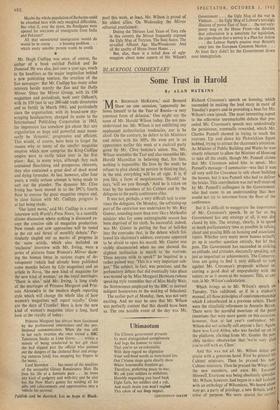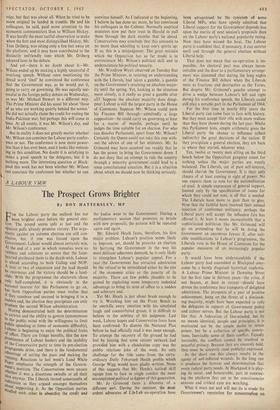BLACKPOOL COMMENTARY
Some Trust in Harold
By ALAN WATKINS
'g R. REGINALD MCKENNA,' said Bernard Shaw on one occasion, 'apparently be- lieves himself to be the Tsar of Russia—a very common form of delusion.' One might say the same of Mr. Harold Wilson today. Do not mis- understand me. Mr. Wilson is not exhibiting any unpleasant authoritarian tendencies, nor is he aloof: On the contrary, he defers to his Ministers and mixes with his MPs. He even put in an appearance earlier this week at a cocktail party given by Mr. Clive Jenkins's union. No, Mr. Wilson resembles the Tsar and also resembles Mr. Harold Macmillan in believing that, for. him, nothing is impossible. He lives by the week; he refuses to plan ahead; he persists in thinking that, in the end, everything will be all right. It is, if you like, a form of megalomania. 'Harold,' he says, 'will see you through.' And he is taken on trust by the members of his Cabinet and by the delegates to the party conference alike.
It was not, perhaps, a very difficult task to con- vince the delegates. On Monday, the softening-up part of the operation was undertaken by Mr. Ray Gunter, sounding more than ever like a Methodist minister who for some unimaginable reason has been deprived of his cloth. So successful, indeed, was Mr. Gunter in putting the fear of hell-fire into the comrades that, in the debate which fol- lowed his chairman's address, everyone appeared to be afraid to open his mouth. Mr. Gunter was visibly disconcerted when no one showed the slightest inclination to march to the rostrum. 'Does anyone wish to speak?' he 'inquired in a rather pained way. 'This is a very important sub- ject.' The subject, in fact, was pensions, and the perfunctory debate that did eventually take place was wound up by Miss Margaret Herbison (whose speaking style resembles that of Miss Molly Weir, the Scotswoman employed by the BBC to instruct indigent housewives in the making of fishcakes).
The earlier part of Monday, then, was not very exciting. And we may be sure that Mr. Wilson was perfectly content that this should have been so. The one notable event of the day was Mr.
Richard Crossman's speech on housing, which succeeded in making the lead story in most of
Tuesday's papers and in providing a base for Mr. Wilson's own speech. The most interesting aspect to the otherwise unremarkable debate that pre, ceded Mr. Crossman's speech was undoubtedly the persistence, eventually rewarded, which Mr. Charles Pannell showed in trying to reach the rostrum. Up and down his Pickwickian figure bobbed, trying to attract the chairman's attention. As Minister of Public Building and Works he was clearly reluctant to allow the Minister of Housing to take all the credit, though Mr. Pannell claims that Mr. Crossman asked him to speak. Mr. Pannell's message—I summarise—was that it was: all very well for Crossman to talk about building the houses, but it was Pannell who had to deliver the bricks. This contribution was not well received, by Mr. Pannell's colleagues in the Government, who had come to an understanding that they would not try to intervene from the floor of the conference.
But it is difficult to exaggerate the importance of Mr. Crossman's speech. In so far as thq. Government has any strategy at all, it was dis closed by him. The strategy, clearly, is to spell(' as much parliamentary time as possible in talking about and passing Bills on housing and associated topics. Whether very many more houses actually go up is another question entirely, but let that pass. The Government has succeeded in striking, an attitude, and attitudes, electorally speaking, are just as important as achievements. The Conserva- tives are going to find it very difficult to vote against Mr. Crossman's proposals without in- curring a good deal of unpopularity with the voters; or so it seems at the moment. This, at any rate, is Mr. Wilson's calculation.
Which brings us to Mr. Wilson's speech on Tuesday. This exhibited, as if in a student's manual, all those principles of conferencemanship which I adumbrated in a previous article. There were the ritualistic references to Aneurin Bevan. There were the scornful mentions of the press (mentions that were more gentle on this occasion, however, than at last year's conference: Mr. Wilson did not actually call anyone a liar). Again, there was Lord Attlee, who was hauled up on 10 the platform, eliciting from Mr. Gunter the pos- sibly tactless observation that 'we're very glad you're still with us, Clem.'
And this was not all. Mr. Wilson doled out praise with a generous hand. First he praised Ins Cabinet ministers. Then he praised his non- Cabinet ministers. Then he praised the Whips. and the new members, and even Mr. Emanuel Shinwell. Everyone was being absolutely splendid. Mr. Wilson, however, had begun in a dull fashion, with an anthology of Wilsoniana. We heard about stop-go, a party of privilege, a new Britain. and sense of purpose. We were spared the cutunt4
edge, but that was about all. When he tried to be more original he landed in trouble. He and his colleagues, he said, paid more attention to the economic commentators than to William Hickey. It was hardly the most tactful observation to make when the first and most distinguilhed Hickey, Mr. Tom Driberg, was sitting only a few feet away on the platform; and it may have contributed to the distinctly unfriendly tone which Mr. Driberg adopted later in the debate.
And yet—there is no doubt about it—Mr. Wilson ended up by making a highly successful if overlong speech. Without once mentioning the dread word 'steel' he convinced the conference that the Government was, as he would put it, going to carry on governing. He was equally suc- cessful in the foreign policy debate on Wednesday, as was Mr. Michael Stewart in a different way. The Prime Minister did his usual bit about 'those of us who are working quietly behind the scenes.' He did not actually claim the credit for ending the India-Pakistan war, but perhaps this will come in time. At all events, it was Mr. Wilson's day, and Mr. Wilson's conference.
But in reality it does not greatly matter whether Mr. Wilson can convince the Labour party confer- ence or not. The conference is now more power- less than it has ever been, and it looks like remain- ing in this condition. No doubt it is satisfying to make a good speech to the delegates, but it is nothing more. The interesting question at Black- Pool this week has not been whether Mr. Wilson can convince the conference but whether he can convince himself. As I indicated at the beginning, I believe he has done so; more, he has convinced his colleagues in the Cabinet. Normally sceptical ministers now put their trust in Harold to pull them through the dark months that lie ahead. Conservatives may conclude that this amounts to no more than whistling to keep one's spirits up. If so, this is a misjudgment. The great mistake which the Opposition has so far made is to overestimate Mr. Wilson's political skill and to underestimate his political tenacity.
Mr. Woodrow Wyatt observed on Tuesday that the Prime Minister, in resisting an understanding with the Liberals, had taken a gamble, a gamble on the Government's retaining an absolute major- ity until the spring. Yet, looking at the situation more closely, is it really so great a gamble after all? Suppose the absolute majority does disap- pear.. Labour is still the largest party in the House of Commons. Suppose Mr. Wilson could push his Finance Bill through—admittedly a large supposition—he could carry on governing at least for a matter of months, perhaps until he judges the time suitable for an election. For who can .dissolve Parliament, apart from Mr. Wilson? Certainly the Queen could not take this step with- out. the advice of one of her ministers. Mr. Jo Grimond may have assumed too readily that he has the power to bring the Government down. I do not deny that an attempt to rule the country through a minority government could lead to a tense constitutional situation. But it is a situation about which we should now be thinking seriously.







































 Previous page
Previous page